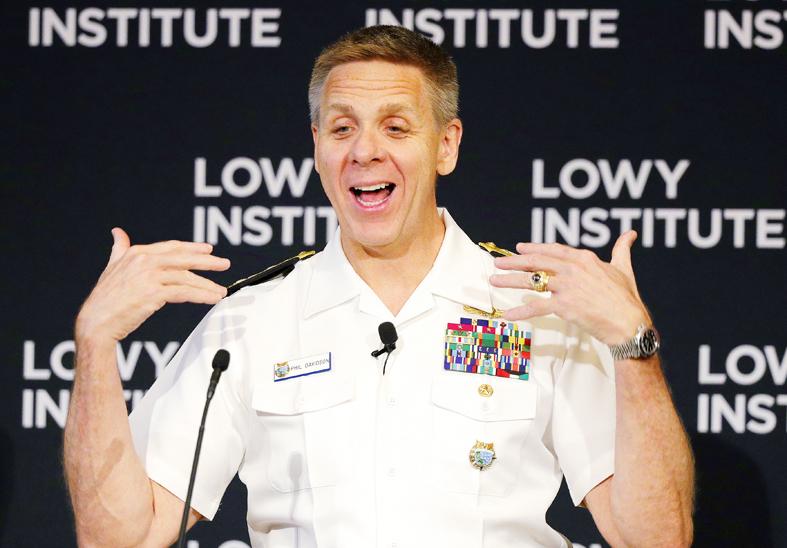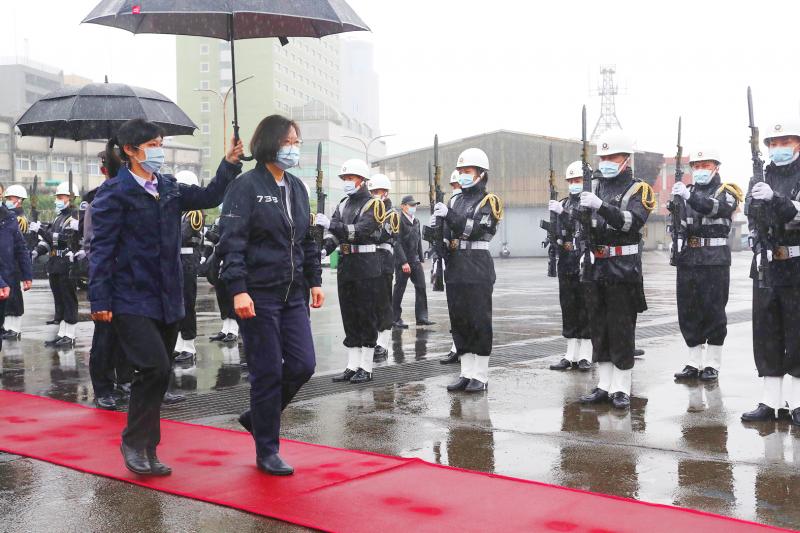China could invade Taiwan within the next six years, US Navy Admiral Philip Davidson said on Tuesday, raising hackles in Beijing, which yesterday accused the top US commander of attempting to “hype up” the threat of an invasion to inflate Washington’s defense spending.
“I worry that they’re [China] accelerating their ambitions to supplant the United States and our leadership role in the rules-based international order ... by 2050,” Washington’s top military officer in the Asia-Pacific region said.
“Taiwan is clearly one of their ambitions before that and I think the threat is manifest during this decade — in fact, in the next six years,” Davidson told a US Senate Committee on Armed Services hearing.

Photo: AP
Former US president Donald Trump embraced warmer ties with Taiwan, as he feuded with China on issues such as trade and national security.
US President Joe Biden’s administration has offered Taiwan cause for optimism for continued support aside from the US Department of State, saying in January that US commitment to the nation is “rock solid.”
Representative to the US Hsiao Bi-khim (蕭美琴) was formally invited to Biden’s inauguration, an unprecedented move since 1979.

Photo: CNA
China has also made expansive territorial claims in the resource-rich South China Sea and even threatens the US territory of Guam, Davidson said.
“Guam is a target today,” he said, adding that the Chinese military released a video simulating an attack on an island base strongly resembling US facilities in Diego Garcia and Guam.
He called on US lawmakers to approve the installation on Guam of an Aegis Ashore anti-missile battery, which is capable of intercepting the most powerful Chinese missiles in flight.
Guam “needs to be defended and it needs to be prepared for the threats that will come in the future,” Davidson said.
In addition to other Aegis missile defense systems destined for Australia and Japan, Davidson called on lawmakers to budget for offensive armaments “to let China know that the costs of what they seek to do are too high.”
Beijing was swift to bat away the admiral’s comments.
“Some US people continue to use the Taiwan issue to hype up China’s military threat,” Chinese Ministry of Foreign Affairs spokesman Zhao Lijian (趙立堅) told reporters in Beijing. “But in essence, this is the US searching for a pretext to increase its military spending, expand its forces and interfere in regional affairs.”

NATIONAL SECURITY THREAT: An official said that Guan Guan’s comments had gone beyond the threshold of free speech, as she advocated for the destruction of the ROC China-born media influencer Guan Guan’s (關關) residency permit has been revoked for repeatedly posting pro-China content that threatens national security, the National Immigration Agency said yesterday. Guan Guan has said many controversial things in her videos posted to Douyin (抖音), including “the red flag will soon be painted all over Taiwan” and “Taiwan is an inseparable part of China,” while expressing hope for expedited “reunification.” The agency received multiple reports alleging that Guan Guan had advocated for armed reunification last year. After investigating, the agency last month issued a notice requiring her to appear and account for her actions. Guan Guan appeared as required,

A strong cold air mass is expected to arrive tonight, bringing a change in weather and a drop in temperature, the Central Weather Administration (CWA) said. The coldest time would be early on Thursday morning, with temperatures in some areas dipping as low as 8°C, it said. Daytime highs yesterday were 22°C to 24°C in northern and eastern Taiwan, and about 25°C to 28°C in the central and southern regions, it said. However, nighttime lows would dip to about 15°C to 16°C in central and northern Taiwan as well as the northeast, and 17°C to 19°C elsewhere, it said. Tropical Storm Nokaen, currently

‘NATO-PLUS’: ‘Our strategic partners in the Indo-Pacific are facing increasing aggression by the Chinese Communist Party,’ US Representative Rob Wittman said The US House of Representatives on Monday released its version of the Consolidated Appropriations Act, which includes US$1.15 billion to support security cooperation with Taiwan. The omnibus act, covering US$1.2 trillion of spending, allocates US$1 billion for the Taiwan Security Cooperation Initiative, as well as US$150 million for the replacement of defense articles and reimbursement of defense services provided to Taiwan. The fund allocations were based on the US National Defense Authorization Act for fiscal 2026 that was passed by the US Congress last month and authorized up to US$1 billion to the US Defense Security Cooperation Agency in support of the

PAPERS, PLEASE: The gang exploited the high value of the passports, selling them at inflated prices to Chinese buyers, who would treat them as ‘invisibility cloaks’ The Yilan District Court has handed four members of a syndicate prison terms ranging from one year and two months to two years and two months for their involvement in a scheme to purchase Taiwanese passports and resell them abroad at a massive markup. A Chinese human smuggling syndicate purchased Taiwanese passports through local criminal networks, exploiting the passports’ visa-free travel privileges to turn a profit of more than 20 times the original price, the court said. Such criminal organizations enable people to impersonate Taiwanese when entering and exiting Taiwan and other countries, undermining social order and the credibility of the nation’s